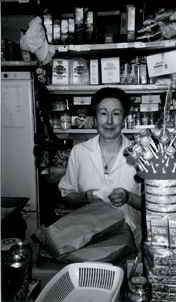A thousand tales of a lost age
In 1999 I arrived in this little village in the Ligurian mountains, a stranger in a strange land. I could speak hardly any Italian. I had been twice to the Venice Biennale and once spent three days in Bologna, and there my knowledge of an entire country ground to an abrupt halt.
 I entered the local shop mute with embarrassed confusion, but Nanda and her niece Eliana didn't treat my wordlessness as a barrier to communication. We began with smiles and sign language, and they were so enthusiastic and gentle in their teaching that I quickly moved to parrot imitations. Soon I was able to prepare shopping lists and tiny comments about the weather, before opening their door and setting the electronic bell jangling above the boxes of fruit and vegetables, the sacks of white beans and dried chestnuts and the mysterious hard biscuits made of barley that look like table mats and must be soaked an hour in cold water before they can begin to claim the name of food. My breakthrough came the morning I read them my translation of that profoundly political poem:
I entered the local shop mute with embarrassed confusion, but Nanda and her niece Eliana didn't treat my wordlessness as a barrier to communication. We began with smiles and sign language, and they were so enthusiastic and gentle in their teaching that I quickly moved to parrot imitations. Soon I was able to prepare shopping lists and tiny comments about the weather, before opening their door and setting the electronic bell jangling above the boxes of fruit and vegetables, the sacks of white beans and dried chestnuts and the mysterious hard biscuits made of barley that look like table mats and must be soaked an hour in cold water before they can begin to claim the name of food. My breakthrough came the morning I read them my translation of that profoundly political poem:
'The rain it raineth every day/Upon the just and unjust fella/But more upon the just because/The unjust hath the just's umbrella.'
Brava! said Nanda, clapping her hands with glee. 'It's just like that in Italy as well. The cunning ones are always the winners!'
Mountain regions have a long history of remoteness. Although from our house we can see the distant triangle of the Mediterranean, the valley is steep and enclosed and gives the sense of being a little kingdom cut off from the rest of the world. The people here, especially the older ones, still treat Italian as a foreign language and talk in a local dialect, which changes dramatically from one village to the next; you understand why when you realise that, until as recently as the 1970s, there was hardly any tarmac road and communities were only connected to their  neighbours by mule tracks, or by the tracery of thin footpaths that follow the high contours of the land.
neighbours by mule tracks, or by the tracery of thin footpaths that follow the high contours of the land.
I wanted to grow roots here, albeit fragile and tentative roots, and for that I needed to know something about the history of the region: the stories that belonged to a ruined house, an elaborately decorated shrine close to a stream, or a mysterious drawing of a ship I had seen carved on a steep cliff face. I began to talk to the old people, reassured by the fact that for them, Italian was also a foreign language, for which they also often forgot the correct grammar or even the right word.
Rather than tumbling in with vague questions about the past, I started with animals: what do dormice eat? Were there always so many wild pigs crashing through the chestnut forests, occasionally causing havoc in your vegetable gardens? How many shepherds used to be on the mountain ridges in the summer, with how many sheep, goats and cows to look after? What is the dialect name for scorpions, for bats, for the wonderful Hoopoe bird, that passes this way in the spring?
I was amazed by how keen people were to talk... Gino stopped me on the street: I must come to him to learn about mules; Adriana telephoned to say three dormice were living in the cupboard above her oliveoil jar if I wanted to see  them; and Rinuccia had found a faded photograph of a wildpig hunt.
them; and Rinuccia had found a faded photograph of a wildpig hunt.
There is a scene in The Leopard by Lampedusa, in which the old prince realises that, although new generations will follow him, he is the end of a line, the last witness to a lost age. There is a similar awareness among the people here.
Armando, who has just turned 86, said that since he doesn't sleep at night, he might as well write down his memories and presented me with a sheaf of papers, vividly describing his experiences as a young and terrified partisan swept up in the chaos of the last war. Tunin spoke of what it meant to be mezzadri or halfpeople, belonging to a feudal lord. Adriana put into careful words her understanding of the nature of human destiny. Terzina, who is even older than Armando, sat in the main square in the abandoned village of her childhood and relived the terrible day when the fascists came and the blood of her friends stained the snow.
Most memorable of all, Giovanin, the last of the shepherds, sat outside his mountain hut with a full moon shining on him and his flock, and he spoke of history, going back to Napoleon and Garibaldi, to the Saracen invaders and then, in one leap, to the Neolithic herder ancestors.
Julia's book Thin Paths (Jonathan Cape, £17.99), pays homage to these people and the home that, thanks to them, is now hers, too.



